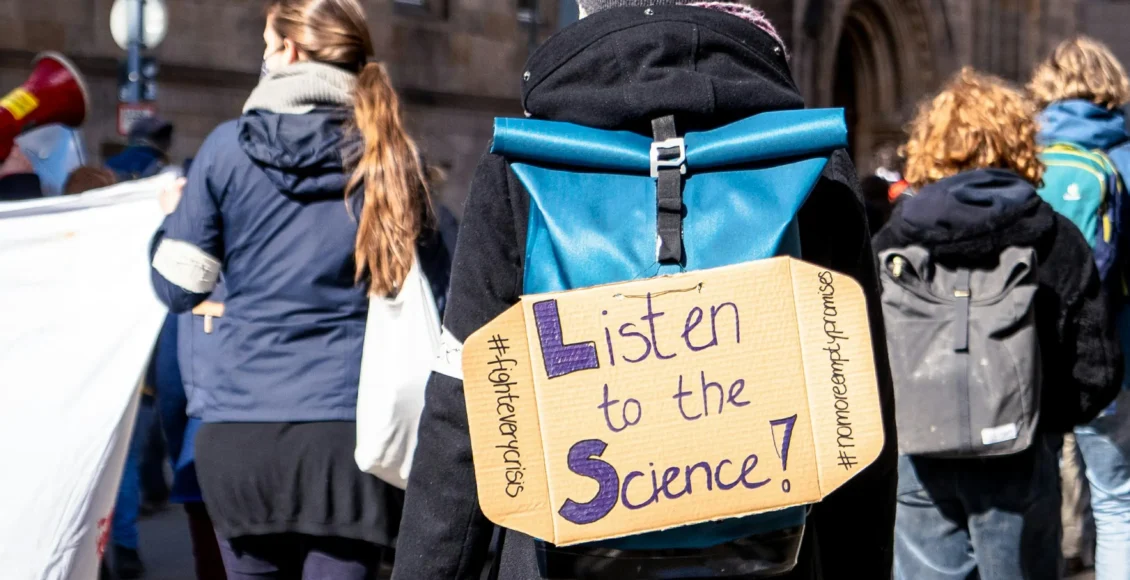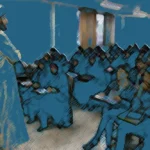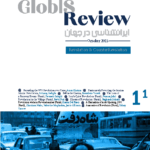Why haven’t We Claimed Academic Freedom?
Interview with Homa Hoodfar
Jun 15, 2024
Reading Time: 20 minutes
Professor Hoodfar, thank you for accepting our invitation to discuss your upcoming book on academic freedom. You’re well-known for your work in gender studies and legal and political anthropology. What sparked your interest in researching academic freedom?
Academic freedom wasn’t initially my research focus. However, like many academics researching social and public politic in the Middle East, I’ve had to navigate state-imposed limitations. My interest in academic freedom began in the 1980s during my fieldwork in Egypt. At that time, coming from the UK as a PhD student researching urban migration and informal housing, I lived in impoverished neighborhoods where few Egyptians from the middle class would venture. The Egyptian security office, concerned about potential Iranian Islamic revolutionary influences, monitored my activities closely. Despite their monthly interrogations, I managed to continue my research by adapting to their expectations of a Westernized appearance (clothing and makeup) to calm their worries that I was an agent of the Islamic Republic or some Islamist activist, thus avoiding potential deportation.
During my graduate studies at Manchester University, and later at Kent University, interactions with friends from Chile, Mexico, and Turkey made me realize they enjoyed much more freedom in what they researched or published than we did in the Middle East, and certainly in Iran, whether under the Pahlavi regime or the Islamic Republic. So, I wondered why social research faced such extreme scrutiny in Iran but not in Latin America, India, or even Pakistan. This disparity prompted my ongoing reflection on academic freedom, culminating in a profound realization of its critical impact on researchers’ lives, whether faculty or graduate students, during my later visits to Iran.
Some years back when I was in Iran, the security office called me in for questioning, a rather unfortunate but normalized practice by now. In my defense, to their inquiry of who had ordered me to do the research I do, I asserted that as a scholar I have academic freedom and do not need permission from anyone or any university office to conduct research. The security officials, unfamiliar with such claims from scholars, who usually would defend themselves claiming their constitutional right to freedom of expression, speculated that this must be a new trick by the CIA against the regime. This was followed by many long interrogations about the nature of academic freedom. Their incredulity led me to ponder whether other Iranian scholars had ever presented academic freedom as their justification and rights. This led me to ponder why academic freedom was not as widely debated in Iran and the Middle East as human rights, despite its significance in scholarly pursuits. This experience, coupled with discussions and lectures upon returning to Montreal, eventually inspired me to write a book aimed at fostering a broader understanding of the importance of academic freedom as a pillar of democracy among younger scholars.
I began discussing my ideas with various colleagues and realized that those in the natural sciences don’t dwell on this issue; they simply consider academic freedom a given part of their job. Of course, they don’t face the extent of scrutiny we do. However, those in social sciences and humanities mostly believed that without democracy there can be no academic freedom—that’s it! The concept of advocating for academic freedom and the right to form associations at universities seemed, if not foreign, rather unrealistic to many of our colleagues. We, as a community of scholars, haven’t reflected deeply enough on these matters and their importance for our profession and for teaching our students. This is a trend that I see changing, pioneered mostly by Turkish scholars who, under the government of Recep Tayyip Erdogan, particularly since 2016 have lost the limited academic freedom that they once enjoyed.
I understand that your book discusses your personal and intellectual engagement with academic freedom. What about the history of academic freedom in the contexts you have worked in? Does your book cover such a history?
Obviously, my major concern is the Middle East, particularly Iran, because that’s where I do research. I am more familiar with the debates or lack of debates on the topic and the Islamization of the university that occurred there. My book tells the story of academic freedom through my dialogue with my interrogators. Every questioning session turned into a kind of a bizarre lecture. It still seems strange to me that they were so interested in understanding academic freedom and how it was viewed historically in Europe and various Islamic eras, particularly since they initially claimed it was another CIA ploy to be used against the Islamic Republic. All these stories are woven into one in the book because I wanted to write an easy-reading, interesting text to engage students and younger researchers in this important question.
The book follows the story of these lectures. I tried to reflect on these interrogations more systematically when I was alone, and that reflection became part of the book. In anthropology, we feel if we keep the story as it is—what happened to us—and discuss our reflections later, it would be more appealing. So, I have tried to keep it in that order, which may not have the best logical sequence, but it reflects the order in which things happened, unraveled, and how I thought about the issues.
In the process of reflecting on academic freedom, I realized I had to examine its recent history and how it has been disseminated and shaped in different societies and within the global academic community. I didn’t have access to a library and had to rely on my own experience and knowledge, which worked well. We usually don’t use our passive knowledge, but in Evin, I had to do it. That was kind of empowering for me. I thought about how colonization and modernization impacted the modern university and academic cultures, what happened to academics and intellectuals in Russia after the socialist revolution, what inspired hostility towards intellectuals in Germany, and whether these developments were interrelated. For example, many German scholars went to Turkey or the US and took with them the ideas of the German academy, including academic freedom, which had started in the eighteenth and nineteenth centuries.[1]Left, Laurel. “Well Worth Saving: American Universities’ Life-and-Death Decisions on Refugees from Nazi Europe.” New Haven and London: Yale University press, 2019.
The idea of academic freedom emerges in the context of the Enlightenment Movement in 18th-century Europe, with a reference to the Greek tradition of reasoning to discover the truth. Do you think such historical references are meaningful or helpful in our context?
It depends on how you define academic freedom. You can trace it back to Nalanda, the ancient Indian university that was functioning in the 4th century BC/CE. Professors and students, who had joined the university after passing an entrance test, benefited from academic freedom. They could ask any questions in their discussion groups, including religious ones. The university was destroyed in the 5th century AD, but its students from China and Persia took the idea to their own countries. It’s part of the colonial legacy that we often look to the West for intellectual history. Many of us do not know that there is a university in Morocco older than Oxford, recognized by UNESCO as the oldest continuously degree-giving university. Therefore, academic freedom is not exclusively Western when considering the tradition of reasoning, although it accelerated during the Enlightenment period.
During the Golden Age of Islam (8 to 13th century), scholars from China, Greece, India, Africa, and Central Asia gathered in educational centers. In places like the House of Wisdom, Zoroastrian, Jewish, Buddhist, and Muslim scholars discussed philosophy, sciences, medicine, astronomy, and mathematics together. Scholars were invited to translate pivotal works into Arabic, preserving many ancient Greek texts that were otherwise lost, later translated back into Latin in subsequent centuries. However, this intellectual environment was not always stable; it changed with wars and shifts in power. Scholars like Ibn Sina and philosophers like Mulla Sadra had to move from city to city due to political and religious opposition to their ideas. Their migrations show the limits of academic freedom in pre-modern Asia and the Middle East. Iranians fled to India, Indians to China, and Chinese to other places to escape persecution, but in doing so they also spread knowledge and ideas.
Some time ago, I watched a documentary about Mulla Sadra (1572- 1641). The authorities and gatekeepers of knowledge disagreed with his philosophical perspectives and exiled him to a village near present-day Qom, where he was forbidden to write or teach for 15 years—similar to sending scholars to Evin prison today. Finally, the ruler of Shiraz, who valued knowledge and intellectual pursuits, invited him back, establishing a center where he could resume his intellectual work. However, neither the documentary nor any writings I have seen discuss the broader damage inflicted on him and the community during his forced silence. As a society and academic community, we must recognize the costs of silencing scholars as part of public discourse. These discussions should begin with historical cases like Mulla Sadra and Zakaria Razi, a chief physician and pioneer scientist and philosopher over 1,000 years ago, who advocated for experimental observations over blind adherence to traditional texts. I am not suggesting we disregard the remarkable history of Western knowledge, but rather that we also examine our own history of knowledge creation and the hostility towards thinkers.
Does the definition of academic freedom change as we move into the modern era?
The social forces for change and advancement were entirely different in the 18th century. The conflict between those in power, clinging to conventional wisdom that upheld their authority, and those advocating for change intensified dramatically. The church played a pivotal role in Europe, funding many universities at the time. Bishops sought to control education, which was previously conducted in small church-affiliated schools. People would set up these schools like shops on every corner, teaching as they saw fit. If they disagreed with one bishop, they could relocate their “shop” to another area. In response, the church initiated and funded larger universities to exert control over the education process. In a way it was not unlike setting up the Qom religious seminary in Iran. However, this initiative created new tensions between the universities and the church.
I believe Bologna was among the very first universities to draft a charter asserting their scholars’ rights to discuss matters freely among themselves, without fear. This gradually expanded to include discussions on topics considered blasphemous, laying the foundation for academic freedom. In this context, figures like Giordano Bruno and Galileo became symbols of the struggle for intellectual freedom, while scholars like Mulla Sadra or Ibn Sina were intentionally overlooked. I say “intentionally” because those who colonized our regions were well aware of our history and our scholars, recognizing that science and knowledge transcend boundaries, yet chose to overlook this glaring fact.
Today, universities are recognized as integral to the knowledge production system that drives societal development. This recognition positions universities as small islands where unconventional ideas can flourish. Yet, even in modern times, this situation remains challenging, and scholars often find themselves marginalized. As we see today, when scholars’ views challenge those in power (including university funders), they face expulsion and other restrictions. The opposition to fields like gender studies or critical race theory, which examine how racism persists despite apparent reforms, serves as a poignant example of powerful entities attempting to dictate university curricula. Academia is resisting, which has brought debates around academic freedom to the forefront of university life in Western countries.
The situation during the Nazi regime in Germany illustrates that economic contributions from knowledge production do not necessarily guarantee recognition of academic freedom by those in power. Conversely, after the 1917 revolution, many academics were expelled from the Soviet Union, giving new life to debates around the value of academic freedom. German scholars who once enjoyed the freedom to research and experiment suddenly found themselves restricted by the Nazi regime. Upon fleeing to Europe, the US, or Turkey, they carried the ideals of institutions like Humboldt University with them across the world.
Back to the Middle East, Egypt is a country with a history of maintaining libraries and scholarship produced in many centuries. But it seems that universities were doing better under the Ottoman Empire than in early 20th-century Egypt regarding academic freedom. Why? What happened in these countries?
Well, there was a university reform under the Ottoman Empire, which lasted for 500 years. They started the reforms in the early 18th century because they realized they were losing ground to Europe. They wanted to compete with the West, so they needed to learn how administration should work. They saw themselves as an empire that once was much better off than Europe. So, it became acceptable to learn from the West, their neighboring countries with whom they already traded. They created typical colleges and a higher education system, with people moving back and forth within the country and the empire, including Egypt, which had been a center for learning for long centuries. Moreover, the Ottoman Empire had a substantial Christian population and a large Jewish community. Greece was part of the Ottoman Empire back then. For historical and religious reasons, these ethnic groups had a deeper connection with Europe and were influenced by European debates, transmitting some of the public debates, including those on citizens’ rights and representative government, which impacted university life.
However, the question of academic freedom as we know it today emerged after the First World War with the establishment of modern universities. These universities were not like Bologna University, which aimed to create knowledge for its own sake. Instead, their knowledge production served economic or state-building projects. Modern Turkey was eager to learn how to build the state and advance society. A large number of Jewish scholars who were teaching in German universities were expelled even before the war, and they went to Turkey, far enough from home and its persecutions but close enough to return when the Nazis were gone, as they thought the situation would soon change. They were paid well, had translators, and had the chance to continue their research. Some stayed long-term and influenced the formulation of higher education in Turkey, which included multiple tasks.[2]Arnold Reisman, (2007) “German Jewish Intellectuals’ Diaspora in Turkey: 1933–55’, The History ( Vol. 69, No. 3), pp. 450-478. This idea of knowledge for the sake of knowledge and the pursuit of truth became very much a part of the Turkish scholarly system, along with its economic and political missions. The regime didn’t see a danger because these elites also wanted to contribute to nation-state building and the country’s advancement, so there was no major contradiction. However, this situation has changed significantly, particularly under the ruling Justice and Development Party.
At the time, Egypt underwent reform and modernization starting with Muhammad Ali (1769-1849), who set up many modern educational institutions and had to balance between various colonial forces.[3]For brief overview see https://rpl.hds.harvard.edu/faq/muhammad-%E2%80%98ali The Ottoman Empire had lost its influence in Egypt, whose leaders and reformers were looking toward the West, both France and particularly Britain, which had gained control of Egypt’s economy. To a large extent, the anti-colonial movement, which gained new momentum in Egypt after the First World War, needed the support of religious leaders and Al-Azhar University. The price of this alliance was that religious leaders gained more influence over legal and educational changes. While religious leaders had no objection to hard sciences, they were intolerant of social sciences if the subject deviated from conventional norms and Sharia law, a situation that continues to this day. In many ways, this situation resembled the development in Iran during the constitutional movement.
However, the American University in Cairo, which trained the elite, played a nominal role in launching debates, but it never expanded to include other universities in Egypt. So, the academic debates remained rather feeble even if their protection made its way into the constitution in later years. The fact is that unless independent academic associations are formed and supported by the wider academic community, academic freedom remains an idea rather than a force to promote knowledge and truth. Much like Turkey, since the Arab uprising both civil society and universities in Egypt have lost ground to both the state (now a military state) and conservative religious leaders. However, in recent years, there is some movement and public debates by the scholars on academic freedom.[4]For an over view of debates see Ilyas Saliba , 2020,”Academic Freedom In Egypt” https://www.econstor.eu/handle/10419/228741
What international documents support scholars’ efforts to establish these rights in different countries?
Academic freedom has two sides: one is freedom of research and writing, and the other relates to job security, such as having tenure and a sufficient salary, so scholars don’t need to teach at various universities to earn a living wage.[5]For debates on this aspect of academic freedom see Aslı Vatansever, 2020 At the Margins of Academia: Exile, Precariousness, and Subjectivity. Leiden and Boston: Brill The academic side is prominent because otherwise it would be like any labor dispute, while the question is much more complex and nuanced. This issue has not been clearly resolved. Another added problem arises from lack of inclusion of academic freedom in UDHR which only refers the right to education. However, following several cases of professors being dismissed in the United States, the American Association of University Professors (AAUP) pioneered the formulation of a statement of principles on academic freedom and tenure known as the 1915 Declaration of Principles. This statement was then revised in 1940 and continues to be a blueprint for the development of academic freedom.
Unfortunately, despite the huge suffering of academics at the hands of states in the first part of the 20th century and particularly under the Nazi regime, the association did not lobby or participate in the debates around the UDHR to include academic freedom. Even during subsequent debates on the International Covenant on Economic, Social, and Cultural Rights (ICESCR) of 1966, they stayed away. Though, in recent years, academics have been re-examining some of the articles in various UN conventions, such as Article 19 of the UDHR on freedom of expression, Article 15(3) of the ICESCR, which confirms the right to enjoy the benefits of scientific progress, Article 19(2) of the International Covenant on Civil and Political Rights (ICCPR) on the right to science, and Article 15(1)(b) of the ICESCR on the right to enjoy the benefits of scientific progress and its applications, as well as the right to education, Article 13 of the ICESCR, directing education towards the full development of the human personality and a sense of dignity. They aim to mobilize and reinterpret these articles in support of academic freedom. But these efforts, which started around 2014, are still in their infancy and have not yet brought about the desired change.
The problem is that transnational academic organizations are still relatively weak and have not yet coordinated their activities to push for a convention. In the late 1980s, alarmed by the negative implications of the World Bank’s structural adjustment programs and the push for the privatization of universities, the World University Service, an international non-governmental organization founded in 1920 to support higher education institutions, met in Peru and adopted The Lima Declaration on Academic Freedom and Autonomy of Institutions of Higher Education (1988). This was followed by several other organizations, notably the Council for the Development of Social Science Research in Africa (CODESRIA), a pan-African, non-governmental research organization founded in 1973 by African researchers, which adopted the Kampala Declaration on Intellectual Freedom and Social Responsibility on November 19, 1990.
These activities brought new hopes for a UN convention through UNESCO. However, despite much hope and excitement, UNESCO’s efforts led only to the “Recommendation concerning the Status of Higher-Education Teaching Personnel,” which does not have the force of a convention. Nonetheless, I think this can provide a foundation to push for a convention if the transnational academic community organizes coordinated efforts to advocate for it. Such conventions, like the Convention against Torture, will come only through the efforts and commitments of transnational civil society.
What about national charters? How many countries have an academic freedom charter?
Beside the Magna Charta Universitatum which was ratified by 900 European universities in 1988 and revised by the Magna Charta Observatory in 2020 we do not have an international charter[6]See Magna Charta Universitatum 2020 ( https://www.magna-charta.org/magna-charta-universitatum/mcu2020) ,we don’t have an international charter of academic freedom. However, there are many national charters and non-governmental associations that have issued charters and declarations. I think more than 100 countries have charters, and they have borrowed from one another. However, with the exception of the Organization of American States, few regional and international organizations had charters to support academic freedom before 2020. For instance, in 2017, when the government of Hungary tried to curtail the Central European University’s autonomy, the university took its case to the EU court, only to realize that the EU doesn’t have an agreement on academic freedom. The EU was forced to use the trade agreement to support the Central European University. It was at that stage that the EU started to develop an agreement. I participated in some of the sessions, but I left since it was very European-focused and I was unfamiliar with the EU legal system and therefore could not contribute much. However, I continued to follow the case. The EU finally issued The Bonn Declaration on the Freedom of Scientific Research in 2020, which, together with a couple of other official documents, outlines the guidelines for supporting academic freedom.
Do you think the new issues about academic freedom raised by scholars working on or concerned with the question of Palestine in the US and the charges of “anti-Semitic” would promote efforts to have a globally accepted agreement for academic freedom?
The Palestine-Israel question has been hotly debated in academia and beyond for as long as I can remember, but it has never been as divisive as it has been since October 7, 2023, and the unprecedented Gaza war.[7]Judith Butler, 2006. Israel/Palestine and the paradoxes of academic freedom https://www.radicalphilosophy.com/article/israelpalestine-and-the-paradoxes-of-academic-freedom In my view, the heart of the problem is that the definition of “anti-Semitic” has never been clearly established, and many ideological forces resist defining it because they use it as a tool to malign supporters of the Palestinian right to self-determination. However, recent episodes of politicians in high offices taking university officials to task have brought many more academics into the debates on academic freedom. They view these episodes as a continuation of political attacks on critical race theory and gender studies by conservative politicians who do not have the right to interfere in university affairs.[8]Danielle M. Conway, 2022. The Assault on Critical Race Theory as Pretext for Populist The Assault on Critical Race Theory as Pretext for Populist: Backlash on Higher Education, … Continue reading It is unfortunate that many will suffer in these processes, but I see that the debates on academic freedom have taken on new life. We may, in fact, manage to advance the definition of academic freedom, its boundaries, and its legal protection.
The right to be political at the university has been debated for a long time. In 1979 it was okay to be political at universities in Iran. University was “the bastion of revolution” then; one year later it was under attack for being the “bastion of anti-revolution.” How does the right to academic freedom relate to the right to be political at the university?
I suggest that we unpack the question, as it touches upon several issues. It is part of students’ and professors’ academic freedom to hold peaceful discussions, teach on the social and political developments in their university and society, and issue statements. The university authorities have the responsibility of creating a safe atmosphere for debates free from police intervention. Students and professors also have the right to issue statements of solidarity for other scholarly communities. All students and professors, like other citizens, have the right to issue statements about political and social issues as citizens, but not on behalf of the university.
However, looking across the world, we can observe that students who are among the brightest from the younger generation participate in various revolutionary movements. They can imagine an alternative world. After all, a transnational student movement for academic freedom was started by Latin American students, not by professors, in 1918.[9]Schugurensky, Daniel. “1918: Students ignite democratic university reform in Cordoba, Argentina.” http://schugurensky.faculty.asu.edu/moments/1918cordoba.html, 2002. They demanded freedom and autonomy for universities to define their own curriculum and manage their own budget without interference from the central government. These demands and manifestos were endorsed by the international student congress and influenced subsequent academic freedom debates and charters in the Americas and Europe. Student activism is not always against the state; students also participate in environmental movements, peace movements, and consumer protection movements.
Students, whose job is to read, reflect, and imagine the future of their society, are often seen as the conscience of their society. We have seen this in the movements in France and the USA in the 1960s against the war in Vietnam and now we see it against the ongoing genocide in Gaza. They show their willingness to imagine a different world, especially now with new technology that makes them much more aware of news and developments worldwide. In my view, as long as their participation is peaceful, it is part of the learning process and thus part of academic life.
How do you compare the cultural revolution in Iran in 1980 and the political attacks on universities in neighboring countries?
While Erdoğan and the present Turkish state might hope that the end result of their war against academia would give them similar control over universities to that of the Iranian regime, despite their very harsh treatment of the scholarly universities, I very much doubt that. Turkish scholars have had a relative degree of academic freedom. While they might have been lackadaisical about protecting and expanding academic freedom, a regime cannot easily wipe out that history and memory. Unfortunately, it is not just Turkey. Even India, once the envy of other scholars in the region for its academic freedom, has been undermining the academic freedom that is one of the few unintended benefits of the British system. Responsibility for such an attack in part also lies with the scholars themselves who had taken such rights for granted and have not mobilized around it.
I recently read something about a new book on academic freedom in Asia. The editor described how some scholars withdrew their work at the last minute; among them was an Indian author who did so because he was concerned about how the publication would affect his career. That indicated the depth of the problem and the loss of university autonomy. While Indian scholars have started to write on the subject, Turkish scholars, both in and out of the country, have launched both national and global movements to restore academic freedom and find ways to build regional support for academic freedom.
The situation in Iran, however, is very different. Iranian universities, at least since the 1950s, have lost the little autonomy they had when modern universities were set up. After the revolution, the new state, much like the Chinese, wanted to control the university ideologically and produce citizens that support the ideology of the state. The Iranian regime assumes that they can create Islamic knowledge, but they have no definition of what that is besides supporting the regime. Despite waves of dismissals of students and professors, they have not managed to create the academic order they had planned. In fact, as we discussed earlier, students and universities tend to be bastions of opposition to the ideology of the regime. Also, the increased wave of dismissals of professors has resulted in at least some groups in recent years openly discussing the implications of the lack of academic freedom. This is a very positive start because until the movement starts from inside Iran the activism around academic issues outside will not have a strong impact.
Do you think the pedagogy and teaching responsibilities should be part of the charter?
Pedagogy of teaching has a lot to do with academic freedom. Critical thinking should be a major part of teaching pedagogy that trains minds not just at the university level but at all educational levels. Unfortunately, in Iran and many universities in our region, rote learning continues to be the dominant method of teaching. Students are expected to learn what they were taught and reproduce it in exams. This is a recipe for producing docile citizens, but it does not lead to trained and creative minds that can solve the social and economic problems of a given society.
Despite all we claim about equality, the classroom is hierarchical because professors and teachers possess more knowledge, and knowledge is power. However, the heart of teaching is not about the transfer of knowledge; rather, it is about teaching how to think rationally and analytically. For this reason, I have always organized my lectures around questions and sub-questions. The concepts of how, what, why, when, and where have been integral to my learning and teaching.
I realize that, given the political contexts such as in Iran and today’s Turkey, the implications of what is discussed in the classroom might make it hard to follow all these rules. It is for these reasons that the discussion of students’ academic freedom, as well as that of professors, becomes even more urgent and necessary. Academic freedom for the professors is the cornerstone of a safe and hospitable classroom for critical teaching, which in my view is part of the students’ academic freedom.
Our last question is about the research on academic freedom in Iran. Why is there so little literature in Iranian Studies on the topic?
This is a troubling yet very important question. There are many reasons for the poverty of debates on academic freedom. In Iran, modern universities based on secular principles started quite late relative to other countries in the region. The state, which was the founder of modern universities, viewed them as institutions to train the technical and educated class for the running of the modern state. Most university professors, in contrast to public intellectuals, did not see contradictions between the goals of the state and their academic work, particularly since they initially enjoyed relative autonomy in running the universities.
As the Iranian academia’s contact with their regional counterparts was limited, they could not benefit from academic freedom debates in region such as India and Turkey. After the 1953 coup d’état, in congruence with the state’s higher educational policies, academia’s attention was oriented toward Western universities, primarily in the science and industry fields, where the lack of academic freedom was less of a hindrance. Furthermore, except for the period between the Second World War and the coup d’état of 1953, we, as a nation, did not experience anything we could call democracy or an open public sphere welcoming open academic discussion.
The role of the university in the social sciences remained very weak, in part because critical teaching was missing. As you know, there were a few attempts to address issues of academic freedom, but as the state increasingly moved towards an authoritarian ideology, these attempts died down. With the Cultural Revolution and the dismissal of many established professors, the issue attracted some interest, but these responses were neither systematic nor continuous.
I feel another reason is that discussing academic freedom was not one that Western universities at the time viewed as very scholarly; it was mostly considered as an extracurricular activity of the academic community, except if the discussion was about the Israel-Palestine question. It is sad to say that the scholarly community in Iran until recently viewed the struggle for academic freedom as pointless in the absence of democracy. They did not view it as part and parcel of the processes of creating democracy. I am glad to see that recent developments have created interest in academic freedom by Iranian studies scholars both inside and outside Iran.
Endnotes
| ↑1 | Left, Laurel. “Well Worth Saving: American Universities’ Life-and-Death Decisions on Refugees from Nazi Europe.” New Haven and London: Yale University press, 2019. |
|---|---|
| ↑2 | Arnold Reisman, (2007) “German Jewish Intellectuals’ Diaspora in Turkey: 1933–55’, The History ( Vol. 69, No. 3), pp. 450-478. |
| ↑3 | For brief overview see https://rpl.hds.harvard.edu/faq/muhammad-%E2%80%98ali |
| ↑4 | For an over view of debates see Ilyas Saliba , 2020,”Academic Freedom In Egypt” https://www.econstor.eu/handle/10419/228741 |
| ↑5 | For debates on this aspect of academic freedom see Aslı Vatansever, 2020 At the Margins of Academia: Exile, Precariousness, and Subjectivity. Leiden and Boston: Brill |
| ↑6 | See Magna Charta Universitatum 2020 ( https://www.magna-charta.org/magna-charta-universitatum/mcu2020) |
| ↑7 | Judith Butler, 2006. Israel/Palestine and the paradoxes of academic freedom https://www.radicalphilosophy.com/article/israelpalestine-and-the-paradoxes-of-academic-freedom |
| ↑8 | Danielle M. Conway, 2022. The Assault on Critical Race Theory as Pretext for Populist The Assault on Critical Race Theory as Pretext for Populist: Backlash on Higher Education, https://ideas.dickinsonlaw.psu.edu/cgi/viewcontent.cgi?article=1303&context=fac-works |
| ↑9 | Schugurensky, Daniel. “1918: Students ignite democratic university reform in Cordoba, Argentina.” http://schugurensky.faculty.asu.edu/moments/1918cordoba.html, 2002. |








Comments are closed.